Jude Knight's Blog, page 60
May 22, 2021
Writing love
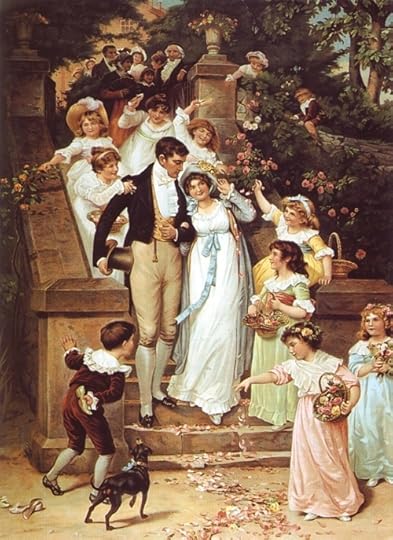
I’ve been thinking about love. It is, at base, what I write about. In both of my current works-in-progress, the hero and heroine have known one another for years, but faced powerful barriers to having a future together. I need to show a love that changes and grows as they do, until they can work through the problems.
In novellas, and particularly in short stories, I often make the hero and heroine separated lovers, old friends or at least acquaintances. Shorter formats give less time for the relationship to develop. People who don’t know one another can fall in love in a flash, but I need enough space to convince the reader that this love will last. That mixture of euphoria, infatuation, and lust that kicks our brain into a mating frenzy is wonderful while it lasts, but love is more than that.
I’ve written elsewhere about levels of intimacy, and why I don’t want to write at the shallow end of the intimacy pool. Today’s philosophical rambling is more about how to take things deep.
C.S. Lewis wrote a book called The Four Loves. He used Latin names but in essence, he talks about:
affection — the love that arises from familiarityfriendship — the love that is based on shared interests, activities, and points of viewromantic — the love that binds a couple together and expresses itself in physical intimacyspiritual — the love God (whomever or whatever you suppose God to be) gives to us and that we give to God, which we show by giving to those in need, whether known or not, whether worthy or not.You can see that you can burrow deeper into each of these, so you’ve got a kind of moving scale:
affection — at one end, the slightly increased comfort a person feels with a stranger who belongs to the same club or who went to the same school; at the other, the love between parent and childfriendship — at one end, people who have chatted with one another occasionally in an online group or met over coffee after bowling club; at the other, people who share ideas, experiences and activities, and who will put their own lives on hold to help one anotherromantic — at the one end, the flash-in-the-pan experience that is largely lust and need; at the other, a deep and unwavering commitment where the happiness of one is needed for the happiness of the otherspiritual — at one end, spare change in a beggar’s bowl; at the other, a life lived entirely in service to rescuing sex slaves in Thailand or building wells in Kenya or providing school lunches in Baltimore or some other specific group of people in need.Of course, in a couple worth reading about, by the end of the novel you’re going to have all four, to at least some level. At least one of them needs to start with some sense of commitment to those in need (because without that, they’re not the kind of people I want to spend several hours with). Over the course of the book, I want to see them develop quite a bit of affection, a good friendship, and a strong attraction that goes beyond the basics. It takes time for those to grow. It takes time to show them.
It’s easier in a novel. Easier still in a series. One of the reasons I like mystery series with a couple as the main protagonists is that the author has time to explore how love changes and deepens, but you can get some of the way even in a novella. You can even hint at it in a short story.
That’s the challenge I set myself every story I write. That’s what I mean by a love story.







May 20, 2021
Lies, spies, and unsung heroes
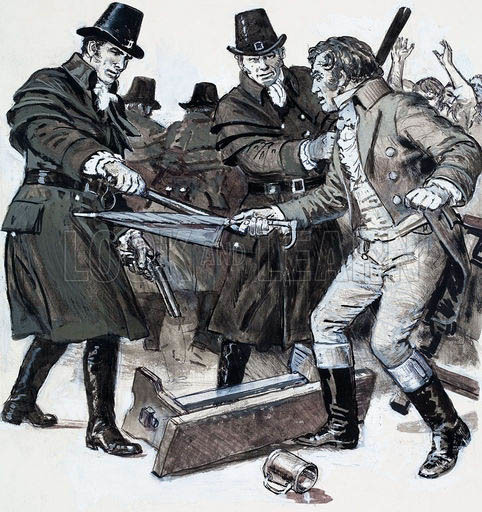
Colonel Edward Despard was arrested before he and his radical friends could seize the Tower of London as part of a revolutionary strike against the Crown.
We’ve loved our spy fiction for over 100 years. The early years of the twentieth century saw the start of the genre, with Kim, by Rudyard Kipling, several books by Joseph Conrad, The Scarlet Pimpernel, by Baroness Orkzy, even some of the Sherlock Holmes stories by Sir Arthur Conan Doyle.
Sexy heroes, thrilling encounters, mysterious beautiful women, and ghastly villains. Spy novels had it all. How things have changed.
Disreputable and dishonestIn the past, spying was a murky hidden business, and spies despised as liars who sold their honour. The British Secret Service was not founded until the twentieth century, and before that spies were seen as dishonest and disreputable. Yet without them, the history of England would be very different.
Henry VIII and Elizabeth I both had spymasters whose extensive spy networks helped keep their royal majesties on their throne.
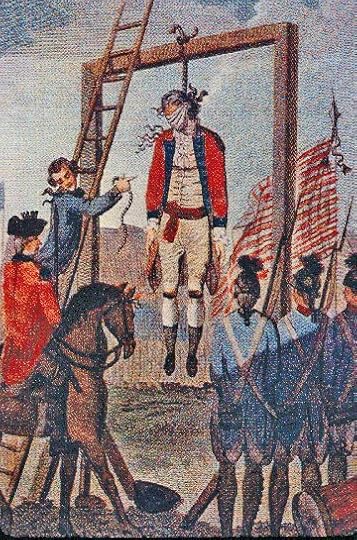
John André was a British Army officer hanged as a spy by the Continental Army during the American Revolutionary War for assisting Benedict Arnold’s attempted surrender of the fort at West Point, New York to the British.
Sir Anthony Standen—torn between loyaltiesOne of those spies was a Catholic refugee from Protestant England, whose reports on the Spanish Armada allowed the English to attack the Spanish Fleet at Cadiz. Drake fired ships and sunk galleys, putting the invasion off for years.
Poor Sir Anthony Standen. His love for England and his love for his faith conflicted, and — although he eventually returned to his home country — he was not welcomed by a grateful nation. Indeed, though he was sent on further spying missions, he was also imprisoned for a time in the Tower of London.
It is an interesting juxtaposition: his sterling work for the Crown did not (in the eyes of some) prove his patriotism, but rather his lack of moral fibre. He spied, therefore he could not be trusted.
Spying at home as well as abroadWalsingham and his successors were as likely to spy on Englishmen as on enemies from abroad. William Pitt the Younger, in more than tripling the amount spent by the government on spying and infiltration of potentially rebellious organisations, was walking in well-trodden footsteps. The budget passed through the hands of a few civil servants at home, and ambassadors and military commanders abroad, with no more accounting than this oath.
I A.B. do swear, That the Money paid to me for Foreign Secret Service, or for Secret Service in detecting, preventing, or defeating, treasonable, or other dangerous Conspiracies against the State…, has been bona fide, applied to the said Purpose or Purposes, and to no other: and that it hath not appeared to me convenient to the State that the same should be paid Abroad. So help me GOD.
A secret part of the Post Office opened, read, and copied mail, especially mail from foreign governments. And both amateur and professional informers reported on their neighbours.
Systematic spyingNapoleon employed a network of spies, under the Minister of Police, Joseph Fouche, who had survived the two previous regimes and would survive the Empire to serve the restored monarchy.
The English system was much more ad hoc. Spies, yes, and many of them, but probably no central co-ordination, though William Savage makes a good argument for the central role of The Alien Office.
Overseas, diplomats and military commanders took the fore. We know the names of some of the diplomatic spymasters who plotted against Napoleon: William Wickham in Switzerland, Francis Drake in Munich and later Italy.
Noble spies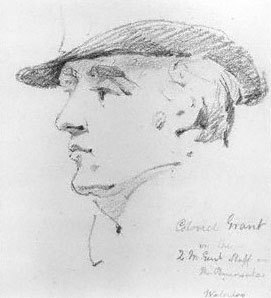
Colquhoun Grant was one of the Duke of Wellington’s most famous exploring officers.
Wellington had ‘exploring officers’, who would have challenged you to a duel had you dared to call them spies. They were officers and gentlemen, and if they did creep behind enemy lines to collect information, they wore their uniforms to do so. Wearing a disguise or other forms of deception would be beneath their code of civilised behaviour.
But Wellington (and other military leaders) also had other intelligence gatherers who were less particular. Did some of them include members of the great aristocratic families of England? If so, we would not expect to find out from the records. Such a secret would reflect badly on those families, and would never be disclosed.
Spies of romanceSo we are free to imagine that the romantic heroes and heroines of our modern stories might represent some, at least, of the spies whose reports on Napoleon’s troops, movements, and intentions saved England from invasion. Or who uncovered plots at home.
I’ve written a spy or two, both for and against England. Prudence Virtue is one. She first appeared in The Prisoner of Wyvern Castle, then in Revealed in Mist, and currently in my latest work in progress, To Claim the Long-Lost Lover as the wife and business partner of David Wakefield, Aldridge’s half brother. Watch out for her adventures.
References:Ioffe, Alexander: Espionage During the Napoleonic Wars. On The Dear Surprise: http://www.thedearsurprise.com/espionage-during-the-napoleonic-wars/
Rice, Patricia: Spies in Regency England. On Word Wenches http://wordwenches.typepad.com/word_wenches/2010/03/spies-in-regency-england.html
Savage, William: The C18th British Secret Service under Pitt. on Pen and Pension: https://penandpension.com/2015/02/24/the-c18th-british-secret-service-under-pitt-1/
Secrets and Spies, National Archives Exhibition: http://www.nationalarchives.gov.uk/spies/spies/default.htm







May 18, 2021
Caring on WIP Wednesday
[image error]
I do love a strong masculine hero who shows his caring side. One of the scenes in Farewell to Kindness, where the hero tenderly washes his beloved’s wounds, is based on an experience in my own life. I’d been in a car accident, and had been through the windscreen. My betrothed came to me at my mother’s house, and gently washed all the blood and glass out of my hair.
Today’s theme is caring for one’s beloved, and I have a piece from To Claim the Long-Lost Lover. Please feel free to share an excerpt in the comments.
Nate fussed over the scrapes and cuts on Sarah’s wrists, the bruises she’d accumulated when she was being manhandled. Wilson had ordered up a hot bath, and he insisted on staying while she undressed so that he could inspect all of her wounds.
Since she was a small girl, Sarah had only ever been unclothed in front of two other people—and that rarely—her maid, when in her bath, and her husband, in the dark and under the sheets on the three nights—four now—she had spent in bed with him. Stripping in front of him in full daylight had her blushing like a young maiden, which she had not been for eight years.
He set her at ease with his manner: crisp and matter of fact, focused on checking that her injuries were no worse than she said. He finished by taking her gently in his arms and pressing a tender kiss to her forehead. “Now have a long soak, my love.” He stepped back and held out his hand to help her into the water. The scrapes stung as she lowered herself, but once she was immersed, the heat felt wonderful.
Nate knelt beside the tub, so his head was close to hers. “Wilson is bringing you a soothing herbal tea. If you will permit, dearest heart, I shall go up to see Elias. I daresay some of today’s doings might have reached the nursery, though I hope his nursemaid will have had enough sense to keep it from him. If not, I will be able to reassure him that you are home and well.”
A swift knock at the door was followed by Wilson’s entrance, with a tea tray. She could smell some of Cook’s delicious drop scones, and suddenly realised that she was hungry.
“Go, of course, she told him. “Tell him I shall be up to see him later.”
“After you have had a sleep,” Nate told her, firmly. “I shall be back by the time the water cools, and shall dress those cuts, then tuck you into bed. Wilson, stay with your mistress and make sure she doesn’t go to sleep in her bath.”
It had always annoyed Sarah when other people made decisions for her, but it was very nice, she decided, when the person doing the deciding loved her to distraction, had suffered when she was taken, and needed her to let him take care of her. Her hero.







May 16, 2021
Tea with Eleanor: Paradise Lost Episode 4

Haverford House, London, April 1812
Eleanor had seen James—the Earl of Sutton, she supposed she must call him. Not that she would have a chance to call him anything. The Duke of Haverford had ordered his household and his dependents and allies to cut the entire Winshire family, and to refuse to attend entertainments where they were present.
Eleanor would have to make do with the glimpse last night at the Farningham ball. She had looked up when the room fell silent, and there he stood on the stairs, surrounded by members of his family, whom she barely noticed. James looked wonderful. More than thirty years had passed, and no person on earth would call him a fribble or useless now. He had been a king somewhere in Central Asia, and wore his authority like an invisible garment. And he was still as handsome as he had been in his twenties.
Eleanor caught herself sighing over James like a silly gosling. Silly, because women did not age as well as men, as the whole world knew. She no longer had the slender waist of a maiden, her hair was beginning to grey, and her face showed the lines her mother swore she would avoid if she never smiled, laughed, frowned, or showed any other emotion. Of course, she had not followed her mother’s instruction, but those who had were no less lined than Eleanor, as far as she could see.
Besides, she was a married woman, and he was a virtuous man who had, by all accounts, deeply loved his wife. Even if he was willing and she was a widow, she would never take a lover. Somewhere within her might lurk the monster that was consuming her husband. Perhaps not. According to the physician, she had a better than even chance. But she would not know until she was sick, or until she was on her deathbed and still clean of the dreadful thing.
***
Haverford Castle, East Kent, 1784
The Duke of Haverford did not bother with greetings or enquiries about Eleanor’s health. He flung open the door without knocking and marched into Eleanor’s sitting room, saying, “What is it, duchess? I have a great deal to do today.”
Inwardly, Eleanor quailed as he stood over her, threat in every line of his posture. Unlike her father, he had never beaten her in cold blood, but she had every reason to fear his temper.
But fear would not serve her here. She was fighting for her life and for the wellbeing of her son. She maintained an outward semblance of calm and gestured to a chair. “Will you not be seated, Your Grace? As I said in my note, I have an important matter to discuss with you.”
Haverford grumbled, but sat; even accepted a cup of tea. The delicate porcelain cup might not survive the next few minutes, but its sacrifice was a small price to pay for giving the discussion a façade of normality.
As she’d hoped, the good manners drilled into every English gentleman in the presence of a lady, even his wife, kept the duke sitting during the ritual of preparing the cup, but he burst out as soon as he accepted it from his wife’s hand. “Well, duchess?”
Eleanor prepared her own cup, glad to have a reason not to look at him as she spoke. “Your Grace, you will be aware that I have been very ill this past six weeks. It is, indeed, why I removed myself to Haverford Castle.”
“Yes, yes. And I’m glad to see you much improved, madam. I have need of you in London.” He condescended to provide an explanation. “The bill I am sponsoring—those idiots who will not listen are much easier to convince after you’ve given them one of your excellent meals, and invited their wives and daughters to your soirees. How soon can you be ready to travel?”
What an excellent opening. “I can pack tomorrow and leave for London the day after, Your Grace.”
Haverford smiled. “Excellent, excellent.” He put the cup down, shifting as if to stand.
“If I do not have a relapse,” Eleanor added.
Haverford sank back into his chair, frowning.
Now to get to the meat of the matter. Eleanor grasped hold of her dwindling supply of courage with both hands. This is about saving Aldridge. The situation in the nursery was fit to ruin him. His attendants had always indulged his every whim, egged on by the duke, who considered himself to be the only person the infant marquis needed to obey. Eleanor’s frequent visits and threats of dismissal allowed him to be raised with some sense of structure and decorum. He knew she would not tolerate rudeness or temper, to her or to his nurses and the maids.
After spending four weeks too sick to leave her bed, she found the nursery in disarray, the young heir ruling the roost. He was in a wild tantrum when she arrived, and the next hour left her drooping with fatigue, and she still had to hunt down the boy’s missing head nurse and find out why she had allowed such chaos to reign.”
The memory prompted her to deal with the minor issue first. “Your affair with Aldridge’s nurse, Your Grace.”







May 11, 2021
Action heroes on Work-in-Progress Wednesday
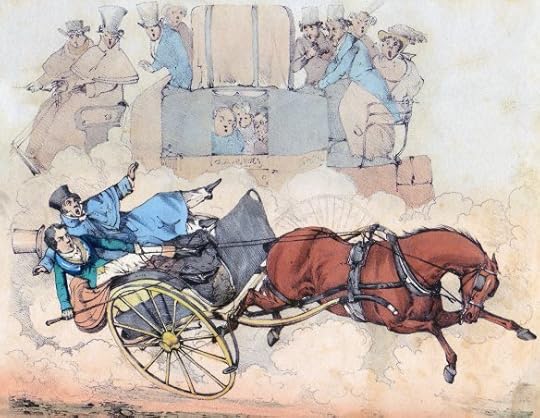
I do like a story with action–were something happens of more consequence that who asks whom to dance or what trim is purchased for a hat or gown. So my poor characters are kidnapped, chased, beaten, battled with, stolen from, abandoned, operated on, shipwrecked…
As always, I invite you to post an excerpt from your current work-in-progress; this week, an action scene.
Mine is from To Claim the Long-Lost Lover.
Nate held on as Aldridge raced his phaeton towards the address Lady Charlotte had given them, weaving close to buildings, feathering past carriages, missing pedestrians by inches, turning corners on a single wheel.
Nate, Drew, and the duke had been about to go upstairs to the nursery when Aldridge arrived, asking anxiously for Charlotte. He had word of a trap set in Clerkenwell; someone who planned to compromise and marry Sarah’s sister. What would the kidnappers do when they found out they had the wrong sister, and a married woman, at that?
If they arrived in time, it would be thanks to Aldridge’s driving skill. On any other day, Nate would be demanding that he slow down, take care. But with Sarah in trouble, he couldn’t go fast enough. He just gripped the side rail of the seat and gritted his teeth, and prayed as he had never prayed before.
How would he tell Elias if anything had happened to her? How would he survive losing her again?
Aldridge hauled the horses to a halt beside a carriage with the Winshire coat of arms. “You’re Lady Sarah’s driver?” he asked the man who sat nervously atop the carriage, a musket across his knees.
“Aye, sir.” The coachman looked towards a narrow gap between the buildings. “I’m waiting for Lady Bentham.”
Nate leapt to the ground, the pistol Uncle James had given him in one hand and his dagger in the other. “How long since my wife went in there, driver?”
“Perhaps fifteen minutes, sir?” the driver answered. “Is there something wrong?”
Aldridge shouted at a man who was lounging against a wall. “You there?!” The man spat a stream of yellow bile into the street and sneered. A coin appeared between Aldridge’s fingers and disappeared as quickly.
“I am the Marquis of Aldridge and I am giving you two options. You make sure no one touches my carriage or my horses or those of Lady Bentham, and you get a crown. Anything happens to either team or rig, and I find you and extract your brains through your nostrils, burn them, and sell them as pie filling. Your choice.” He held up the coin. “A shilling now, the rest when I come back.”
The man straightened. “Done.” He held out a hand and caught the coin that Aldridge tossed even as Nate ran past him into the alley.







May 9, 2021
Tea with Eleanor: Paradise Lost Episode 3

Haverford House, London, March 1812
If she had said ‘yes’, what would have happened? He had a curricle in the mews. They could have left that night, straight from the garden where they’d slipped out for a private conversation. Haverford would not have assaulted her on her way back inside. James would not have challenged him to a duel, wounded him, and been exiled a step ahead of the constable.
Eleanor carefully replaced the rose and took out the letter her maid had brought her the afternoon after Haverford’s horrifying assault had been followed by the announcement of her betrothal. The maid had hidden it under the tray cloth when delivering her breakfast so that the footmen who guarded her bedroom door didn’t see it.
My dearest, dearest love
My father is in it, too. He says that Haverford is to have you, as soon as he has recovered from his wounds.
I wish I had never challenged the duke, or that I had shot to kill. I meant only to defend your honour; to show he could not speak of you as if you were his possession. Even a husband should hesitate to show such disrespect to the woman he has promised to cherish above all others, and so I told him. ‘You are not even her betrothed,’ I told him, ‘and the last man on earth to deserve her’. I am very sorry, Eleanor. I lost my temper, when I should have been thinking of the best way to press my case with your father.
Now, the devil is in it, my father insists that I must flee the country. He says Haverford will have me arrested for shooting him, and Father won’t lift a finger to stop him.
Come with me, Eleanor. The ship my father has organised leaves in two days, but I have a friend who can get me away tomorrow night. I promise I can look after you. I’ve sold the little estate my mother left me, so I have funds. We will go to the Continent. I can find work, I know I can, and we will be together. I know it won’t be what you are used to or what you deserve, but I love you, and you love me. Is that not worth fleeing for?
Meet me by the oak near the back gate of your garden as soon as the house is quiet tomorrow evening. I will be there. We have to be on the ship in time to sail with the dawn, and by the time your household wakes, we shall be gone down the river, and out to sea.
Come with me, my love.
Yours forever
James
Her father’s voice, in her memory. I’m not throwing you away on a third son, Eleanor Creydon. Winderfield is a fribble; a useless pup. Haverford wants you, and I’ve accepted him. Forget Winderfield.
The letter was yellowed with time, and Eleanor, too, had faded with age. But she had not forgotten. She would never forget.
Had she been brave enough or clever enough to break out of her room and evade the guards outside her door and patrolling the garden, Eleanor would not have been left with her reputation in tatters, refusing to marry Haverford and unable to marry James.
If she had continued to refuse, had stayed true to her memories of him, and had not finally given way to her sisters’ pleadings—for Lydia assured her that marriage would free her from the tyranny of her father and Helene had been set firmly on the shelf because of Eleanor’s scandal—she would not have spent thirty-four years married to a monster. But her father and the Duke of Winshire told her James was dead, and after that it didn’t matter what became of her?
They were mistaken, or they lied. Almost certainly, they lied. Now, James was back in England, and she would need to meet him and pretend that they hadn’t broken one another’s hearts so many years ago.
A few tears fell onto the letter, and then the Duchess of Haverford packed everything away, dried her eyes and returned the box to its place.
Weeping over the past and fretting over the future never helped. She had children who loved her, friends, important work in her charities, and a full and busy life.
She smiled at her reflection in the mirror. Her complexion had returned to normal, and her sense of herself, too. The girl who mourned James had become a woman she rather liked. How could she regret any part of the path that led here?







May 6, 2021
Mad as a hatter
The fur trade goes back into the mists of time. Animal skins were a useful source of warm and durable clothing, and back before the human population swelled and fur animals were hunted to the scarcity and even extinction, the supply must have seemed inexhaustible. Even so, by the 17th Century most European populations were severely diminished, and the eyes of European traders turned to the United States. In particular, traders wanted beaver pelts, not for the pelt or even the leather, but for the fur. Beaver fur provided the highest quality felt for hat making. It is tight yet supple, and holds its shape.
Hats, like other forms of dress, played a large role in reflecting one’s social identity. The shape and style of one’s hat indicated to a passerby one’s profession, wealth, and social rank and position. Color, shape, and material all carried specific meaning. In Ecclesiastical heraldry, for example, a red, wide-brimmed hat clearly indicated that its wearer was a cardinal, and interactions required a specific social protocol. In seventeenth century England, the shape and style of one’s hat reflected political and religious affiliation. Due to the expense of a beaver hat, being able to purchase one made a visual statement about one’s wealth and social status. [A brief history of the beaver trade: https://humwp.ucsc.edu/cwh/feinstein/]
Felt is made by applying heat and pressure to a collection of fibres, and beaver fur is particularly suited for felting because of the way the strands of fur stick together. The following video shows the way the process has worked for the past 100 years. It was much harder before the fancy machines.
Back then, the guard hairs were plucked from the pelt by hand, then mercury was brushed over the pelt to roughen the fibre and help each hair to stick to the next. The pelt was dried and then shaved.
The resulting fluff was mixed and then carded. Carding is a process of raking to get all the fibres running in the same direction. Next, the hatter weighed out the quantity of fluff he needed for a particular style of hat.
The fluff then went through a process called bowing to begin the process of sticking all the fibres together. The object was to create two large oval sheets about 4 feet long, 3 feet wide and 6 to 12 inches high, called batts. Now the hatter used heat, pressure (from his hands), and moisture to compress this batt. The process released mercury, which the hatter absorbed. Over time, hatters developed mercury poisoning, which is where we get the phrase, mad as a hatter. By the time this part of the process ends, the two batts have been put back together into a large cone, as you saw in the video.
Then comes planking–dipping the cone into a very hot solution of diluted sulfuric acid, beer-grounds and wine sediments, then working it by hand on planks around the kettle and doing it all over again until the felt was half its size.
After that came blocking, dying, stiffening, brushing, and lining, till at last the hat was ready for the market. The shape of hats changed according to fashion (some of which are explored in the following video). The process remains much the same, except without the mercury poisoning.







May 4, 2021
First kiss on WIP Wednesday
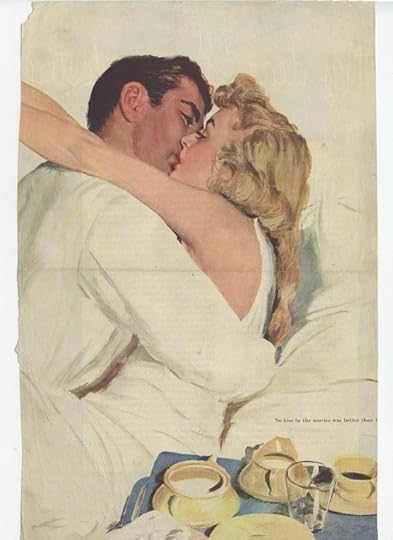
How about a kiss, folks? Put your excerpt in the comments so we can all see it. Mine is from To Claim the Long Lost Lover, which is finally wending its way up to the crisis.
For eight years, memories of their kisses and embraces had fueled her dreams. Tender at first, almost tentative, this kiss set those memories in the shade from the start, and as the heat rose and his free hand pressed her closer; as she spiraled into a a space out of time and place where nothing existed by him, the memories slipped away to be replaced by new ones.
Somehow, the brandy glasses were gone, and both of his hands were on her, and hers on him, untying and stripping off his cravat, fumbling undone the buttons of his waistcoat, pulling his shirt from his pantaloons so she could slide her hands up under it, to stroke and caress his warm firm skin, silk over steel, much more of it than back when he had been a skinny youth just shooting up from boyhood and still inches short of his adult height.
Such random thoughts surfaced and drifted away as he released her for long enough to wriggle out of his waistcoat, pull the shirt over his head, all the while kissing her as if the touch of her lips was keeping him alive.
Then his hands were on her again, and he was kissing her neck and then lower. With her bodice now completely unfastened, her gown slipped down her body to pool around her feet, and she kicked free of it and curved her spine so that he had room to continue to feast while she pressed the rest of her body to his.
The knock on the door was repeated twice before either of them surfaced enough to notice.







May 3, 2021
Tea with Eleanor: Paradise Lost Episode 2

The garden of Creydon House, 1777
Lady Eleanor Creydon traced the words in the water that puddled on the stone rim of the fountain. “Lady James Winderfield.” Her lips curved in a tremulous smile. The man she loved was asking her father for her hand, and would soon come to ask her.
“I have made an appointment to meet your father tomorrow,” he had whispered in her ear last night as they promenaded down the centre of the double line of dancers. Then, as they passed one another, a few moments later, “You know what I want to ask him, my darling.”
She circled the girl at the head of the ladies’ line, barely aware of the other people in the room, conscious only of James and the words that set her heart thumping. Only years of practice kept her moving gracefully back around to meet James again, her arm stretched high, her hand ready for his brief clasp and her ears for another burst of whispered words.
“It is what you want?”
Looking up, she nodded, and the anxiety cleared from his eyes as they met hers. How could he be unsure of her? She had no further opportunity to reassure him. They had to part and dance down the outside of their respective lines, and the music drew to a close before they could speak again.
Her mother had been waiting, and hurried her away. The Earl of Farnmouth, her father, had decided it was time to leave the ball.
Eleanor had lain awake in the night, thinking that tomorrow would never come, but at last the sun had come up, and the interminable morning had passed.
James was with her father now, shut in the earl’s study. Soon, surely, the earl would send him out into the garden. The answer would be yes, of course. As the daughter of an earl, she knew her worth, but James was third son of a duke; a duke, furthermore who was a friend of her father.
Eleanor cast a glance at the house and frowned slightly. Her father would say yes. Of course, he would. Only last week, he had interrupted her dinner with her mother to announce that he expected a very eligible offer for Eleanor’s hand. “I am pleased with your daughter, countess,” he had told her mother. “Betrothed only two months after her debut. You are to be congratulated, madam.”
He had not spoken to Eleanor, but he seldom did, nor had he given a name. Who could it be but James? James was her most ardent suitor. Indeed, since the rapscallion son of the Duke of Winshire had made her the object of his devotion, the rest of her court had fallen away. They had been callow boys, in any case, standing up with her because of childhood friendship or because she had become fashionable.
James was a man, not a boy — twenty-four years to her seventeen. He was unbelievably handsome, charming, clever, funny, and dearer to her than anyone she had ever known, even her older sister. And he had chosen her! She clapped her hands and spun in a circle, unable to contain her delight.
Soon he would come. She composed herself on the stone bench opposite the path by which he would enter the garden. How would he propose? On one knee? Sitting beside her? The thought had her up on her feet again, too excited to stay still, peering down the path.
“Eleanor!” It was a hiss just a hairsbreadth above a whisper.
She spun around. James had come from the other direction. Well, no matter. She hurried towards him; her hands outstretched. He scowled, his eyes blazing in a white face. “James? What is the matter?”
He clasped her hands and pulled her after him into the shadows of the yew walk, where he wrapped his arms around her and rested his chin on her hair. “Eleanor, I love you. I love you more than life itself. You believe me, do you not?”
Eleanor pulled away, but only enough to peer into his eyes. “James? What did my father say?”
James groaned.
“James, you are frightening me. Did he say we must wait?”
“Eleanor, he says that he has given your hand to the Duke of Haverford,” James blurted.
Eleanor’s breath stopped, and the blood surged in her ears as her heart pounded. Her sight grew dark at the edges, and the enormous yew hedges swayed towards her as if to batter her into the ground. By force of will, she fought off her faintness. “But… but he is old,” she stammered, “and a wicked libertine, and cold as ice.” She stamped her foot. “I don’t want him, James. I love you. I love you, James.”
“Shush, my love,” James begged. “We must be quiet. Farnmouth told me I could not see you again, but I had to, Eleanor. I’ll find a way. I promise. You love me, and I love you. I will ask my father to help. He is friends with yours. Surely Winshire can persuade the earl.”
“Yes!” Eleanor’s heart gave another enormous thump, this time with relief. “We will be together?” she asked.
“We will marry,” James promised. He bent his head and his lips touched hers. It was a gentle, reverent salute, but Eleanor pressed closer and the kiss changed, James’s lips still soft, but questing, moving, devouring. His tongue pressed the seam of her mouth and swept inside when she gasped. Again, the darkness hovered, but this time it was a welcoming warmth, a giving and taking of sensation, a merging of selves so that Eleanor no longer knew who sighed and who moaned, or how long they stayed intertwined.
The whistling of a gardener brought them back to themselves. “I must go,” James told her. “Stay strong, my love. We are meant to be together, and I will find a way.”
“We are meant to be together,” she agreed.







May 1, 2021
The wealth issue

Hall of Mirrors at Versaille, France, 17th century
I have a problem with writing about wealthy aristocrats or oligarchs.
Since the invention of agriculture, sumptuous living has depended on the poverty of others. Wealth inequality began when the first ruler of a city state set some of his people to work in the fields and some to bop on the head any field workers who might object to the assignment, while he and his favourites got looked after. Sure, they had the tough job of telling everyone else what to do, and of going out to fight other city states when one side or the other wanted to extend their power and their authority. Conspicuous consumption led to envy on the part of others and a lust for a share. But for the peasants in the field and the servants scrubbing the pots, who was on top made very little difference.
Those of us who grew up in middle-class enclaves in Western countries after the second world war tend to forget this reality. In the 1950s and 60s, the oligarchs of our nations were carrying on the practice of centuries, exporting the exploitation of workers to poorer countries where their misery was out of sight. And few of us moved among the poor of our own countries often enough and humbly enough to recognise that theories about self-inflicted poverty where lies to protect the rich.
In the 18th century, Adam Smith wrote:
‘Wherever there is great property, there is great inequality. For one very rich man there must be at least five hundred poor, and the affluence of the few supposes the indigence of the many.’
In France in that century, the five hundred poor had had enough. Conspicuous consumption led to envy on the part of others and a lust for a share. The excesses of the French Revolution were horrible. Innocent people died in their masses, and their wealth or lack of it, their guilt or innocence, didn’t make a shard of difference. I’m delighted that the United Kingdom, from which my family lines come, managed to avoid following the French path to the guillotine. At least some of the British leaders saw the danger and shared power in a way that didn’t happen in France. Also, the government suppressed any hint of revolution with a ruthless hand. And the English middle-class had power enough and wealth enough not to follow their poorer brethren into blood, fire, and gore.
It was a fairly close run thing, at times.

The Music Room, Brighton Pavilion, England, Regency era
The noble classes about whom most of us Regency authors write had huge inherited wealth, though the value of agriculture-based enterprise was waning, leading to brutal land grabs through the enclosure acts and the Highland clearances. Even those who behaved fairly to their tenants came to their wealth through dubious means.
‘It is very well known that in England (and the same will be found in other countries) the great landed estates, now held in descent, were plundered from the quiet inhabitants at the conquest. The possibility did not exist of acquiring such estates honestly… That they were not acquired by trade, by commerce, by manufactures, by agriculture or by any reputable employment is certain. How then were they acquired? Blush, aristocracy, to hear your origin, for your progenitors were Thieves…When they had committed the robbery, they endeavoured to lose the disgrace of it, by sinking their real names under fictious ones, which they called Titles. It is ever the practice of Felons to act in this manner.’ (Thomas Paine)
A new class of industrialists and merchants were growing fortunes on the backs of sugar and tea plantations staffed by slaves, factories and mines staffed by underpaid workers including children as young as five, and gunboat diplomacy around the globe. In the middle of the 19th century, John Stuart Mills wrote:
‘The social arrangements of modern Europe commenced from a distribution of property which was the result… of conquest and violence: …the system still retains many and large traces of its origins. The laws of property have never yet conformed to the principles on which the justification of private property rests. They have made property of things which never ought to be property, and absolute property where only a qualified property ought to exist. They have not held the balance fairly between human beings, but have heaped impediments upon some, to give advantage to others; they have purposely fostered inequalities, and prevented all from starting fair in the race.’
Mills believed (and so do I, for that matter) that there’s nothing wrong with owning stuff that you’ve acquired through your own personal efforts. But owning twenty or fifty or eighty times as much as the average Joe? While paying starvation wages? That can’t be right.
So I make my aristocrats supporters of philanthropic causes, and I send them into Parliament to fight for fairer laws. They wear expensive clothing and surround themselves with the expensive trappings of their status, but I try to make them thoughtful about such things. It’s a balance.
But it’s a hard one, especially as I watch the 21st century repeating the mistakes of the past eleven thousand years. We have our own Palaces of Versailles, our own Brighton Pavilions.

Manhattan Townhouse, 21st Century
The richest United States families have an average income of 80 times the income of the average worker, and every country of the world has its own oligarchs, who would rather spend money on security and protection that share what they’ve managed to acquire.
It just isn’t fair.










